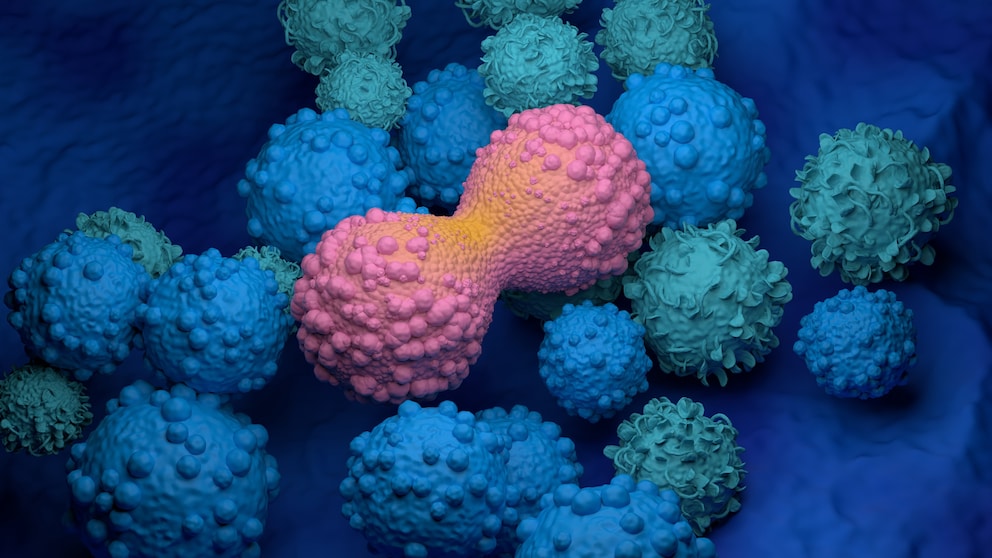November 27, 2024, 4:18 pm | Read time: 5 minutes
The coronavirus pandemic dominated world events from 2020 to 2023. No wonder most people don’t like to think back to this time. It is all the more surprising that a study has now shown a positive effect of coronavirus infection on cancer tumors.
The coronavirus pandemic has cost countless lives. However, the associated restrictions on freedom have also left their mark and divided society. Last but not least, many people are still suffering from the consequences of a coronavirus infection, for example, in the form of Long Covid. For some of those affected, the symptoms are even more severe than those of cancer patients. A new study has now been published that, exceptionally, shows a positive side effect of coronavirus on cancer of all things. Scientists say that cancer tumors may shrink as a result of a corona infection. However, the study on which this finding is based must be viewed with caution.
Overview
In search of an effective cancer therapy
Fighting cancer is one of the greatest medical challenges. Researchers around the world are working to develop effective cancer therapies. And this is urgently needed, as cancer is one of the most common causes of death. In 2023, there were 238,622 deaths from cancer in Germany alone, according to an analysis by the Statista database.1 This makes cancer the second most common cause of death after cardiovascular diseases. This is why research successes in cancer therapies are particularly important. For example, FITBOOK reported on a new type of self-destruction mechanism that researchers were able to trigger in cancer cells. Now, scientists have discovered in studies on mice that the dreaded corona infection may inhibit the growth of cancer tumors.2
Researchers experimented with different types of cancer
In the current study, researchers from Northwestern University in Chicago investigated the effectiveness of white blood cells in fighting cancer. The so-called monocytes play a decisive role in the body’s own defense against infections and diseases. They are also known as phagocytes because they defend the immune system against pathogens.
In order to prove the effectiveness of monocytes, the scientists carried out experiments on mice. The mice had various types of cancer in an advanced stage (so-called stage 4). They suffered from either skin, lung, breast, or colon cancer. For treatment, the mice were given a drug that triggered an immune response similar to a severe corona infection. This led to an increased production of monocytes.
The astonishing effect of this treatment was that all four types of cancer tumors in the mice began to shrink after this corona-like infection.
Special monocytes cause cancer tumors to shrink
In contrast to normal monocytes, which can be converted by tumors for their own protection, the monocytes triggered here retained their cancer-fighting properties. They were even able to penetrate directly into the tumors. This is a special feature because most immune cells cannot do this. Once there, they activated the natural killer cells. These killer cells then attacked the cancer cells and caused the tumors to shrink.
Of particular interest is the fact that a severe coronavirus infection triggers the body to produce these unique anti-cancer monocytes. This finding could now open up new possibilities for cancer treatment. This is because there is a special mechanism behind this that could possibly be mimicked with medication. The researchers discovered that these monocytes triggered by the coronavirus infection have a special receptor. This receptor binds well to a specific sequence of COVID RNA.
According to the researchers, it is unlikely that the existing corona vaccines trigger this mechanism. This is because they do not contain the full RNA sequence of the virus. However, thanks to this study, drugs and vaccines that stimulate the production of cancer-fighting monocytes could be developed in the future. However, this will require further research on humans, as previous studies have been carried out on mice.

Study shows Even mild coronavirus disease can have consequences for the brain in adolescents

Developed by Stanford Researchers New Method to Increase the Effectiveness of the Flu Vaccine

New study Coronavirus vaccination can possibly lead to heart scarring
Researchers warn cancer patients against deliberate infection with corona!
However, the researchers are warning people not to deliberately infect themselves with coronavirus in order to trigger this cancer-fighting mechanism – if it works at all in humans. This is because coronavirus infections can still lead to severe symptoms and, in the worst case, even death. There is also a risk of contracting long Covid. However, the study may help to develop drugs and therapies in the future that make use of the cancer-fighting mechanism without putting patients at risk.
Until now, cancer patients have been warned about coronavirus infections. The Cancer Information Service, for example, points out that corona particularly endangers patients suffering from blood cancer and patients with advanced cancer.3 They have an increased risk of a severe course of Covid-19. This also applies to patients whose body’s own immune system is severely weakened by medication, for example. Instead, vaccination is recommended to protect against infection.
There have also been individual cases in which a cancer patient from England (61) and another in Italy (20) were able to defeat a large proportion of the cancer cells after a coronavirus infection.4 However, when these became public in 2021, experts were already certain that they were purely isolated cases. “In very rare cases, there is the phenomenon that cancers can shrink as a result of a general infection. This was first described back in 1893 – that’s how immunotherapy was invented,” explained oncologist Michael von Bergwelt in an interview with Bild.

